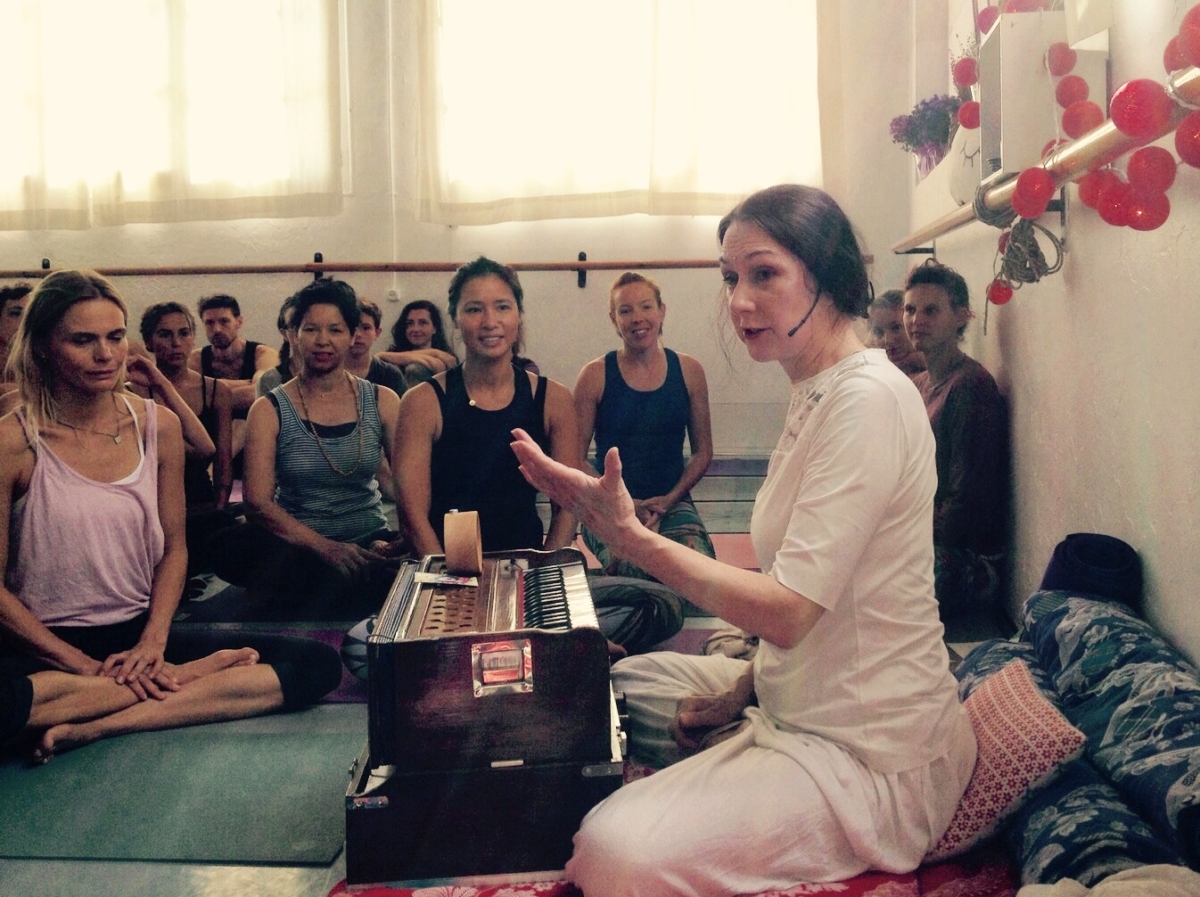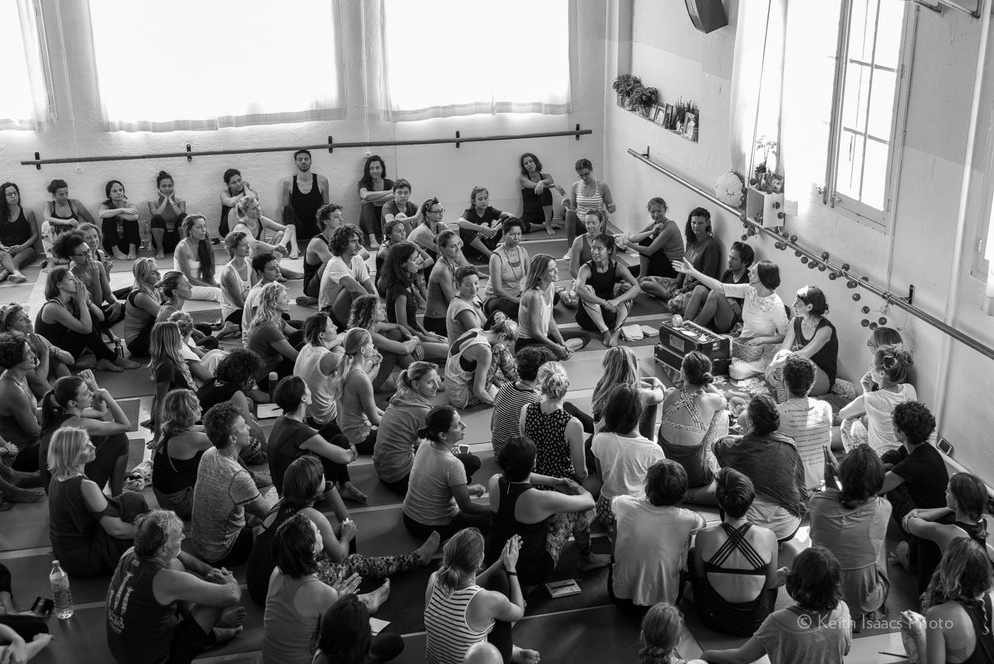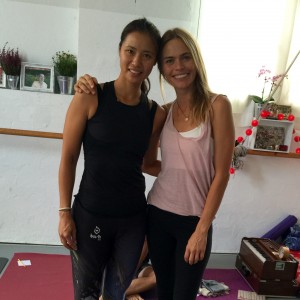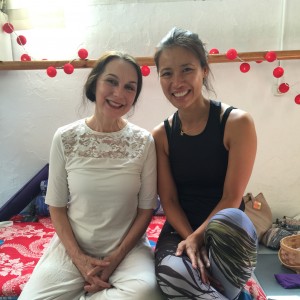Interview with Sharon Gannon by Xuan-Lan
Barcelona, Spain Oct 2015
El pasado mes Octubre, Juliette de Yoga con Gracia organizó un taller de 2 días de Jivamukti Yoga.
Más de 50 personas de toda Europa se reunió en un amplio espacio de Gracia para recibir la enseñanza de Jivamukti yoga de la mano de su fundadora, Sharon Gannon. Este estilo de yoga dinámico poco conocido en España todavía pero practicado por miles de personas a través del mundo. Todo empezó en Nueva York hace más de 30 años….
1-Q: We are very pleased and honored to have had you here in Barcelona for a special 2-day workshop at Yoga con Gracia this past September. For Spanish yogis, Jivamukti Yoga is still a new style of yoga and not yet available or known in our country. Can you explain to them what the word Jivamukti means; is it a yoga style, method, school, community, how do you define it?
SHARON: The word jivamukti is composed of two words: jiva= individual soul + mukti=liberation. Jivamukti means soul liberation. When the soul remembers his or her connection to God—this remembrance liberates the jiva from all forms of ignorance, mistaken identity and suffering. The word Jivamukti is equivalent to enlightenment.
Jivamukti is a brand name that David Life and I have adopted (from the original Sanskrit term, which is spelled: jivanmukti), to describe our method or style of Yoga. Jivamukti Yoga is a methodology and a philosophy and from it the Jivamukti Yoga School has developed. The method is taught and practiced by an international community of Jivamukti students and teachers. When asked “What is Jivamukti Yoga”, we usually answer: “Jivamukti Yoga is a path to enlightenment through compassion for all beings.”
2-Q: When you founded Jivamukti yoga in the 80´s with your partner David Life, were you conscious of creating your own style
SHARON: Yes. Before David and I began earnestly to practice asanas we had been practicing meditation as well as studying the ancient yogic texts. We were also involved in animal rights activism. While in NYC we started to practice yoga asana with many teachers and were exposed to many styles and approaches. Besides going to yoga classes we also practiced by ourselves at home. That home practice included listening to music while practicing asana, it also included chanting mantras and reading and discussing sacred texts with each other. The word got out that we practiced yoga, so when people would approach us with various questions for example, “Can you teach me to meditate?” or “Do you know anything about pranayama?” or “Who is Krishna?” or “Are you a vegetarian—do you have to be a vegetarian to practice yoga?” or “What’s wrong with drinking milk—aren’t cows sacred in India?” or “Can you stand on your head—could you teach me to stand on my head?” or “What does standing on your head have to do with enlightenment?” or “If you are flexible does that mean you are spiritually advanced?” or “Can yoga help me to loose weight?” or “What is Kashmiri Shavitism?” or “Which is better Buddhism or yoga?” or Why do you like to listen to Indian music?” or “Where the Beatles yogis?” or “What is the Bhagavad Gita about?” or “Do you have to believe in God to practice yoga?” or “If you’re a vegan where do you get your protein?” –we were challenged by these questions and worked hard to come up answers that inspired in a positive way. What that quickly evolved into was the Jivamukti Yoga method, which we started teaching to a few friends in our apartment.
3-Q: Since then you have trained many/thousands of teachers who are spreading your ¨method¨ around the world. How do you explain the interest and success of Jivamukti?
SHARON: I would venture to guess for the same reasons that it appeals to me—it satisfies deep needs and desires—it encourages the importance of remembering God and being kind to others. It provides guidelines to live a more liberated life, a more conscious life, a less self-centered life—a happier life. It makes people happy.
4-Q: Did it evolve and change since you created it?
SHARON: Yes, although the philosophical principles and basic tenets have always remained the same, how to integrate those tenets has evolved according to the various needs of the people who are embracing Jivamukti Yoga as a lifestyle. We always used the classroom to promote veganism and animal rights. In fact I could say that I only became a yoga teacher because I felt it would provide me with a better platform for animal rights and vegan activism.
5-Q: For people who don´t know about Jivamukti yoga can you explain what differentiates it from other dynamic yoga styles.
SHARON: It is other-centered, it perceives yoga not as just a way to improve ones physical health but it is more holistic. It has high aims for the practitioner equating yoga with enlightenment. It is a lifestyle approach, emphasizing the development of the whole person into a (w)holy-being. We emphasis the development of compassion, kindness and humility because these qualities can help a person become an instrument for God’s will, rather than a skin-encapsulated ego considered only with acquiring more for themselves. When a person is arrogant, self-centered and bound by ego attachment it is difficult to become a liberated soul (a jivamukta). A liberated soul is fearless because they have faith in the innate goodness of the eternal soul. They act not strictly for their own sake but for the good of all beings. A liberated soul sees holiness in others and thus lives to enhance the lives of others—contributing to more happiness in the world for all beings.
One of the main things that strike most people about Jivamukti Yoga is the emphasis on ahimsa (non-harming)—especially expressed in veganism and animal rights activism. Jivamukti Yoga certainly did not invent ahimsa. The practice of ahimsa has been around for thousands of years and forms the foundation for most spiritual traditions and religions in the world, but for the most part it has been limited to mean don’t harm other human beings. Jivamukti Yoga, has radically taken the practice of ahimsa to the next level and include not only human beings but all beings—including other animals as well as the environment. We teach asana according to Patanjali’s Yoga sutra—as seat as connection or relationship to the Earth. So we teach the practice of yoga asanas as a way to improve our relationship to the Earth and all other beings—with the aim of creating mutually beneficial relationships in our lives—that is pretty radical in a world-wide culture that has conditioned us to believe that the Earth (as well as other animals) belongs to us. We are told that we do not have to be concerned about the happiness or liberation of other animals or the environment—that animals and trees, rivers etc. exist to be exploited by human beings—to benefit human beings.
The spiritual activism of Jivamukti Yoga includes a strong emphasis on veganism, animal rights and environmentalism. This may sound political and make some uncomfortable because for so long to be spiritual meant that you were not political. Because we see spirituality and politics as complimentary rather than opposing we are not afraid of being radically political and consider ourselves spiritual activists. The word politic actually means the greater body and refers to the community of others. Seen in that way can any of us help but to be political? Our individual actions always affect others in our community. As spiritual people we see the community as an extension of our self and so naturally we would want our actions to enhance the lives of others and contribute to a happy community for all involved. We acknowledge that how we treat others will be how we will be treated.
If we want to increase happiness and decrease the amount of suffering in ourselves and in our world, veganism is simply the most direct way. When we stop treating animals and the Earth as commodities to be exploited, we begin to cure ourselves of the disease of speciesism, a deeply ingrained prejudice. This evolved way of perceiving other animals and the Earth with kindness and respect will no doubt lead to peace of mind for ourselves as well as peace on Earth—a win-win for all involved. We are in the midst of a global crisis. Raising animals for food has been proved to be the leading cause of the environmental devastation of our planet—directly causing water shortages and water pollution, increase of toxic pesticides, herbicides and GMOs in the environment, extinction of species, global warming and deforestation. Eating meat and dairy products is a health hazard. The medical community as proven that the consumption of meat and dairy is linked to many human diseases, including heart disease, stroke, cancer, diabetes and obesity.
6-Q: How did you defined and choose the 5 main pillars of Jivamukti yoga among all the vast ancient yoga philosophy: Ahimsa, Bhakti, Dhyana, Shastra, and Nada?
SHARON: Many years ago, as the administrator of a large yoga school, I had to develop guidelines for the teachers, to help them better refine their teaching skills. When I reflected on my own personal guidelines—what I used to inform the way I taught, those five principles emerged. I taught them to our staff of teachers as a way to empower their teachings. I felt that in order for the practice of yoga to transform an ordinary person into a spiritual activist—into a yogi who was able to realize the Oneness of being, that practice had to help remove all prejudices against others; it had to dissolve otherness so that Oneness could be realized. I feel that the practice of yoga must help us to remember God and encourage us to be kind to others as well as make us happy or why bother doing it? Building our yoga practice and the way we structure a class upon a strong foundation, which these 5 tenets provide, can move us as teachers and students alike closer to our goal—Yoga. Delving into each one of the five tenets will encourage the developement of humility and humility is the key to enlightenment.
Para practicar Jivamukti Yoga en Barcelona:
Yoga con Gracia
Jivamukti Yoga Barcelona
y consultar la web internacional de Jivamukti Yoga






La entrevista es muy inpirador. Que hermosa visión tiene Sharon. Me gustaria saber más de Jivamukti Yoga.